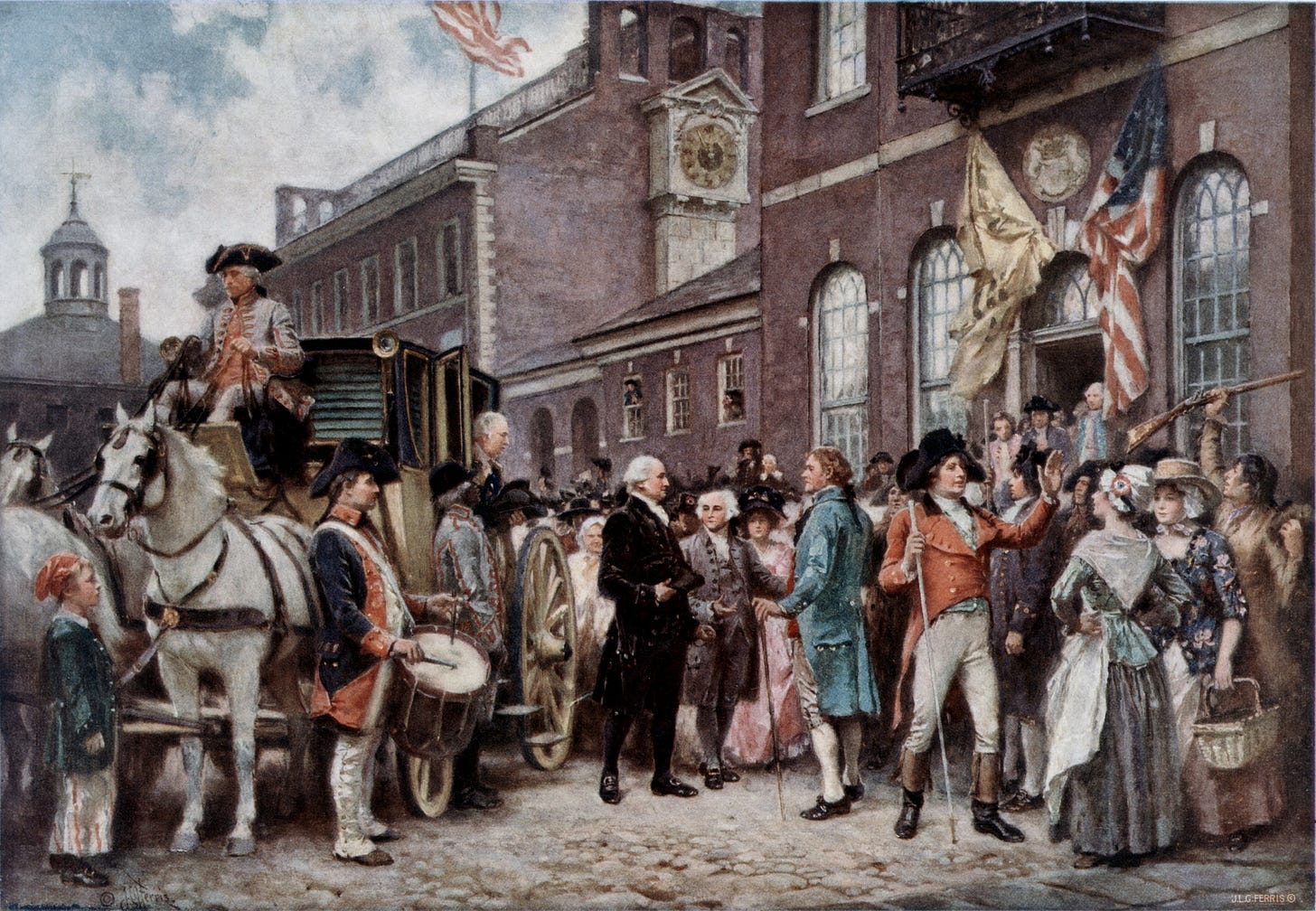Inauguration Day Is What’s Best About America
A chance for affirming and renewing our belief in our founding principles.

‘These are the times that try men’s souls,” Thomas Paine famously claimed in The American Crisis, his pamphlet published only days before George Washington’s crossing of the Delaware on Christmas 1776. Paine could have been just as easily writing about the past two weeks or the past year.
But Inauguration Day, whether held on January 20 (since 1937) or March 4 (from 1789 to 1933), has always been a day of renewal for our country. It represents one of the most important moments in our shared civic and political life. Every inauguration is the culmination of a democratic selection process spanning months. And some three dozen of these inaugurations have been transitions of power from one president to another. Nearly all have been peaceful.
This act of transferring power from one president to another, often deep rivals, is what is best about America—although it’s not even mentioned in the Trump administration’s just-released “1776 Report.” It continues the legacy of General Washington surrendering his military commission to the Continental Congress in 1783, and of President Washington turning over his office to John Adams in 1797. In an age of monarchs, it was among the first times that power was not transferred by blood. Four years later, despite bitter partisanship, Adams in turn ceded control to Thomas Jefferson in 1801. And so on and on.
This year’s inauguration will be different in two respects from those that came before. Many of the usual celebrations will be lacking, as this is the first inauguration to be held in the midst of a global pandemic. (George Washington’s oath-taking was months removed from a yellow fever outbreak, while Woodrow Wilson and Warren G. Harding were sworn in respectively before and after the Spanish flu pandemic.) And, coming two weeks after the storming of the same Capitol that will host the presidential swearing-in, in the background of this year’s ceremony will be a visible military presence to prevent any further disruption.
America has faced crises before, of course, from its founding to Pearl Harbor to 9/11. (As historian Jay Sexton puts it, ours is A Nation Forged by Crisis.) Still even in the aftermath of the election of 1860, which resulted in the rapid secession of seven states, President James Buchanan gave way to President Abraham Lincoln. Yes, there have been cases when political campaigns, elections, and government at the local, state, and national levels have been met with riots, attacks, assassination attempts, and even insurrection. Some of these shameful episodes, such as in the horrific 1898 Wilmington Massacre in North Carolina, in which white insurrectionists seized control of the government and murdered scores of African Americans, deserve wider recognition. Still, none of these events offered as credible a challenge to the sanctity of the tradition of quadrennial presidential inaugurations as the crisis of January 6.
“Crisis may beget crisis,” said President Franklin D. Roosevelt in 1940, but it has historically also created unity. It was a realization that George Washington made during his first inaugural address. Offering reflections “arising out of the present crisis” of the Revolution, Shays’ Rebellion, and the uncertainty of the first constitution (the Articles of Confederation), the first president described the new Constitution as born from the “voluntary consent of so many distinct communities.” The preservation of “the sacred fire of liberty,” Washington said, would be staked on the “experiment” in self-government “entrusted to the hands of the American people.” Calamities and times of hardship brought politicians, civilians, and the military together in shared cause—a pattern repeated over the centuries.
Four years later, in his second inaugural address—still the shortest of all time, at only 135 words—Washington pointed out the weight of the oath he was about to take, the same constitutionally prescribed oath that all his successors have taken, and how if he failed to live up to it he would be subjected “to the upbraidings of all who are now witnesses.” Four years after that, John Adams similarly promised “without hesitation, to lay myself under the most Solemn Obligations to support” the Constitution and said he “entertain[ed] no doubt of its continuance.” And four years after that, Thomas Jefferson appealed to his fellow countrymen to rise above partisanship, saying, “We are all Republicans, we are all Federalists.”
Joe Biden and Kamala Harris will take their oaths of office today. But they aren’t alone. While the wording differs from office to office, millions of Americans—members of Congress, executive branch officials, civil servants, officers and enlisted members of the military (as the Joint Chiefs recently reminded us), and many other citizens in varying ways—have sworn oaths or taken pledges to “defend the Constitution of the United States.”
Whether or not you’ve taken a similar oath, today’s Inauguration Day offers a chance for all of us to renew our belief in America’s founding principles. Such a revival is not dependent solely on the ascent of a lone individual, but on the chance for a shared national commitment to the example of Washington, Adams, and Jefferson in the hopes of centuries more of peaceful transitions.









